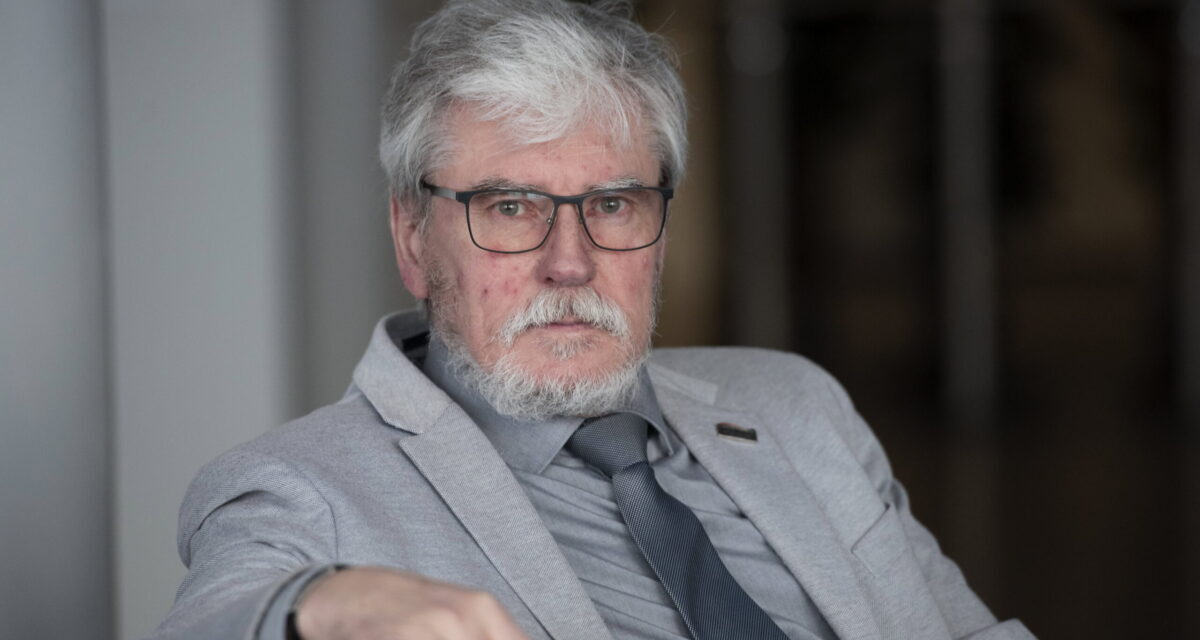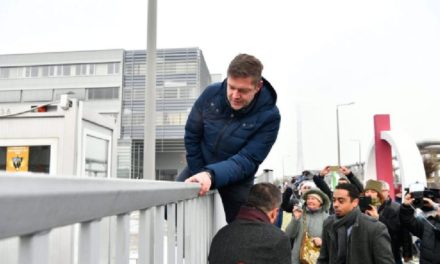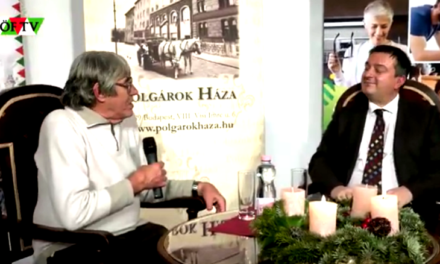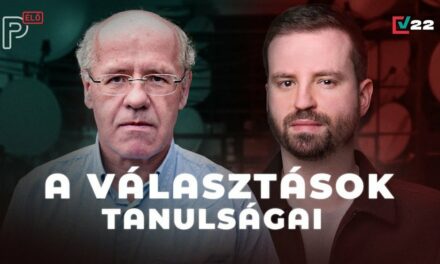If we erase history, we lose not only our past and our future, but also ourselves.
Ten years ago, on January 2, 2014, the Veritas Historical Research Institute began its operations, and from 2018 it became the Veritas Historical Research Institute and Archives. Today, it has grown into one of the most important bases for Hungarian historical research. Interview with Sándor Szakály, the director general of the institution.
What happened in 2014? Did the government want to lead historical research on new paths?
The idea was formulated in government circles in 2013 that there should be a workshop that tries to present the period of the Antall and Boross governments, as well as the process and internal connections of the system change. But don't just research in this narrow spectrum, but examine how the country's destiny developed, how the independent Hungarian state began to take shape in the decades from the settlement to 1918, and what else the 20th century brought to Hungarians. century. In three research groups, we try to fulfill our tasks, to present the past one hundred and fifty years of Hungarian history. One workshop examines the age of dualism, the other the Horthy era, and the third examines our history after 1945, focusing mainly on 1956 and the regime change.
Has no one dealt with this yet? Didn't the different research institutes of the Hungarian Academy of Sciences research these periods?
It is typical that historical research institutes deal with all eras. In the Institute of History of the Hungarian Academy of Sciences, which for a few years has been called the Institute of History of the Humanities Research Center, the research work carried out there has spanned more than a thousand years from the conquest to the present day. But they were focused on something else, like us. In any case, the history profession should be happy about the establishment of every new institute, because it also increases its opportunities, the idea that more eyes can see more can prevail, and each colleague can find the workshop where they can develop the most.
Did the profession applaud or whistle when Veritas was founded?
Then, in the late fall of 2013, emails went around protesting the creation of Veritas. They wrote letters explaining why the institute should not be established.
It passed, we survived, and later it became clear to everyone that we are dealing here with historical research and not political propaganda. No one controls us from above, we don't need to research the history of Fidesz, because this is what Veritas was initially accused of. When I was appointed, I also received my own, as a Fidesz mercenary, a liar and who knows what else. Most of the research institutes that had reservations about us now see Veritas as a partner, and the same is the case with universities.
However, the public occasionally mentions that perhaps there have been too many historical research institutes. For example, the John Lukacs Institute launched the other day...
To find out how big this apparatus can actually be, you have to look at how many people work in each institute, what their main research area is and what they have produced so far. Only in this way could we get a realistic picture of this scientific segment.
What did the work of the new research institutes change compared to the linear spirit of socialist historiography that is still alive today?
When I started my career as a historian in the 1980s, it was already possible to speak out of this linearity on certain topics. I wrote my book The Hungarian Military Elite 1938–1945, which was published in 1987 and was a great success, praised even by colleagues who otherwise represented a completely different point of view. And why? Because I stuck strictly to the facts. It may differ, just as the ethos of today's institutions differs from one another, but the most important cornerstone of historical science is that the workshops do not differ in respect for the facts. Of course, the most varied conclusions can be drawn from the facts, but the battle of Mohács was definitely lost by the Hungarian army, let's not change that. We can already argue about what decisions, mistakes, omissions, etc. led to the defeat.
Yes, but to an outsider it seems that some historians today prefer narratives, i.e. subjective explanations of events, and not facts...
The main problem with this is that it is only possible to evaluate a historical event based on the knowledge of former conditions, customs, reflexes, and international relations. It is necessary to know in advance what kind of information the actors of that time made their decisions on the basis of. What socialist historiography represented should also be undressed. Because, for example, he treated the decision-makers of the Horthy era as those who originally wanted the country to be bad. It was not possible to talk positively about the establishment of the Hungarian National Bank or about the fact that almost all members of Hungarian society were enthusiastic about the regional feedback, regardless of order, rank, or denomination. These were all reprehensible phenomena. It was a big and unexpected event when the historian György Ránki hinted in the form of a question mark in 1978 in the columns of Élét és Irodalom that even Soviet planes could have bombed Kassa in 1941. A huge debate erupted from this.
What Ránki did was not common, but as a defining figure in the profession, he could go this far. Until then, the official version regarding Kassa was the guilty wink of the German and Hungarian leadership.
Every year in January, we are forced to read in most newspapers and internet platforms that 200,000 Hungarian soldiers fell during the Don breakthrough. How could this untruth, deeply burned into the social consciousness, be rectified?
The media and several research institutes express different opinions on the issue, but it is a proven fact that the loss of the Hungarian 2nd army, which can be counted in heroic deaths and missing, was 42,000. 26,000 soldiers and labor servicemen fell into Soviet prisoners of war, and slightly more than 28,000 wounded were transported back to Hungary by the medical service on trains. The facts should be respected. The works of those researchers who put their analyzes on paper based on archival data should be read and popularized. To be a bit cynical, I belong to the group of historians who believe that facts are also important in the science of history.
It is common to experience, especially on the left-liberal side, that some historians put their research at the service of ideology. Doesn't this approach devalue the profession?
This road leads nowhere. It is an impossible claim, for example, that the 133 days of the Hungarian Soviet Republic in 1919 would have been a glorious historical episode. This makes it even truer that the Red Army at that time served the country. It had militarily incompetent leaders, but these, putting aside their communist leanings, took capable, experienced, patriotic officers on their side. People who later earned the most important command positions in the Royal Hungarian Defense Forces, and according to some even today in the so-called Horthy army, because they understood their profession.
Mária Vásárhelyi recently again accused the Hungarians of not facing their past... Does the left face its past?
I respect Imre Nagy for what he did in 1956.
But we know that Imre Nagy fought for the success of the Bolsheviks in Soviet Russia after 1917. Already from 1945, he became an active part of the developing Rákosi system.
In retrospect, many people call him a land-distributing politician, except that in 1945 the land that was taken from others was distributed. Some people believe that, as the president of the Council of Ministers of the Hungarian People's Republic, he eased the grip of the communist dictatorship. Yes, but he also did this half-heartedly, the 1953 amnesty, for example, turned out to be quite controversial. 1956 came, and after a while Imre Nagy agreed with the revolutionary demands. According to some people who remember him, he believed that in the new Hungary created after the free elections, he could be a prominent figure in an 8-10 percent left-wing party. Yes, he was right when he chose the nation between the idea and the nation before the people's court. Knowing it will cost him his life. Is this how today's left faces the memory of Imre Nagy?
What do you consider Veritas' biggest achievement to date?
That, starting from scratch, it was possible to build an institution in ten years. Today, Veritas does not have a researcher who does not have a scientific degree, in fact, several of the colleagues in non-research positions also have one. Anyway, the institute has published 33 volumes in the Veritas books series, the Veritas Yearbook is published every year, and then we also have to talk about our Veritas Booklets series, we are now at the 23rd publication. These are smaller works. In addition, we organized many high-quality, interesting conferences, which were hosted in the upper house of the Parliament in many cases. We have launched a major research program entitled Trianon and Hungarian higher education, and another major program is now the analysis of the functioning of the governments led by József Antall and Péter Boross. We have already published several volumes on this topic.
Is history still important? Even on the right, you can hear from time to time that we should leave the past behind and deal with the present instead, since there are so many interesting things here... And then I'm not even talking about the rapidly spreading erasure culture.
Rather, I come across opinions that say it would be good if they finally taught history properly in schools. Without an understood past, we lose the future. And we cannot understand why we are where we are today.
The woke movement would erase history, but its big mistake is that the XXI. measures the events of two or three hundred years ago with the eyes of the 20th century. Not knowing, for example, that most slaves came from the white race throughout history.
They throw out the historical figures who created and operated the United States of America. The other is that we shouldn't entrust the leadership of, say, Hungary to television personalities. Even if so many people are watching them. Even at the university, I notice how worryingly low people's knowledge level has fallen. They believe everything that appears on various Internet sites. I don't want censorship, but big bullshit shouldn't be published. True, there is a user demand for it...
We can also ask the previous question, whether there are other elements of history that have not been discovered by science...
It always is. The research of no era can be considered closed and definitive. It happened to me that I used the term Horthy army in my thesis. But then I realized that there was no such thing in reality; what I thought was called the Royal Hungarian Defense Forces. The Horthy army as a combination of words was, of course, considered a dishonorable name at the time. It was used by the entire profession. The historian György Borsányi, who was not an enemy of the socialist system, wrote a biography of Béla Kun. The system immediately withdrew the volume. The people of the authority asked the sellers in rural bookstores about who bought Borsányi's volume. If they got both a name and an address, they collected the book. There were some new features that were unpleasant for the system.
What did Veritas come up with in terms of research related to József Antall? How does public opinion relate to the memory of the former prime minister?
Those who have lived through it have different experiences of system change. The question is what leeway the governing parties and the opposition had then. József Antall once said about this that we know what should be done and we do what we can. The main criticism concerns the management of the national debt. It should be noted, however, that most of the loans came from private banks, and it would have been impossible to come to an agreement with them individually. Were we expecting gestures? Of course, if Helmut Kohl had said that the Federal Republic of Germany had given the Kádár system 50 million dollars and was now renouncing it, the situation would be different. We see that after the system change, people's individual and political freedom increased, but the difficulties of living also increased, and the general sense of security provided by socialism disappeared. This was also the price of change. With all that, and despite everything, it was worth it!
Featured image: Széchenyi Prize-winning historian Sándor Szákály, who was awarded the 2022 Prima Prize in the category of Hungarian science, director general of the VERITAS Historical Research Institute and Archives in Budapest on January 18, 2023.
MTI/Gyula Czimbal












